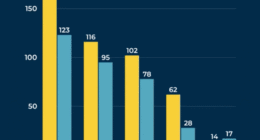The majority of unemployed people in Germany have a ‘migration background’, a shocking new reports has found.
Germany has 2.8 million unemployed individuals, and among them, 1.5 million or 54% have a ‘migration background’, a report from the federal employment agency shared with Bild newspaper revealed.
Around 80 percent of them have immigrated to Germany themselves and 19 percent have German citizenship after their parents immigrated.
Out of the total number of unemployed, approximately 881,000 people have been out of work for two years or more, classifying them as long-term unemployed, with 52% of this group being immigrants or descendants of immigrants.
The study also shows that 82 per cent of unemployed foreigners in Germany have no completed vocational training.
The number for those from countries with a high number of asylum seekers coming to Europe was even higher at 91 per cent.
Meanwhile, for those with German citizenship the number of unemployed people without vocational training was around 51 per cent.
Rene Springer, a member of the Alternative for Germany (AfD) party who initiated the study, expressed to Bild that individuals in Germany who lack both a job and professional qualifications after years in the country are not skilled laborers but rather a consistent strain on the social welfare system.

File image of people visiting a job fair for refugees in the foyer of the World Trade Center in Dresden, Germany

Alternative for Germany (AfD) politician Rene Springer (pictured), who commissioned the study, told Bild: ‘Those who, after years in Germany, have neither a professional qualification nor a job are not skilled workers, but rather a permanent burden on our social system’
This comes after labour market researcher Holger Schafer from the German economic institute told Bild that skilled workers are generally not migrating to Germany.
He said that many foreigners come to Germany ‘for humanitarian reasons, not to fill gaps in the German labour market’, particularly because they are often from countries where the vocational training system is underdeveloped.
Schafer says that Germany needs skilled workers to immigrate, as otherwise ‘it would be hopeless to compensate for the retirement of the baby boomer generation, and we would inevitably face a loss of prosperity’.
The study comes as temporarily suspended any further admission of refugees via a UN resettlement programme, the dpa news agency reported on Tuesday, citing the interior ministry and the UN refugee agency (UNHCR).
The ministry had no immediate comment on the report when contacted by Reuters and the UNHCR could not be immediately reached.
Migration has been a contentious issue in government coalition negotiations between Germany’s conservative CDU/CSU bloc and the Social Democrats.
The conservatives are advocating for a stricter approach to asylum seekers in response to rising support of the far-right AfD party and several violent incidents involving refugees.

Of 2.8 million unemployed people in Germany, 1.5 million – 54 per cent – have a ‘migration background’, according to a report by the federal employment agency seen by the Bild newspaper (file image of people queuing outside a German job centre)
So far in the coalition talks, which are yet to be sealed, the two sides struck an initial agreement to end voluntary federal admission programmes for refugees wherever possible and not launch any new programmes, according to a document seen by Reuters.
According to the interior ministry, Germany planned to offer up to 6,560 places as part of an EU resettlement programme this year.
This programme typically accepts refugees of various nationalities or stateless individuals from countries including Egypt, Jordan, Kenya, Lebanon, Pakistan and Libya.

















